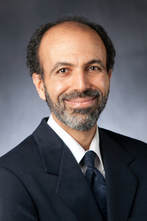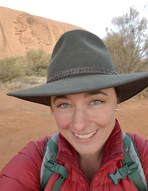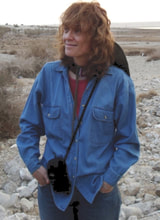2018-19 Series

Rescheduled: Thursday, November 29, 2018
Dr. Mohamed Noor - Duke University
"Using Star Trek to understand evolution: How could there have been so many alien species?"
7:30 PM, 159 Russell Hall
Mohamed Noor is a professor and former department chair of Biology at Duke University. His team uses fruit flies to understand the genetic changes associated with forming new species. He teaches courses on genetics and evolution, and he has held many significant scientific society roles, including currently serving as the editor-in-chief of the research journal "Evolution". He is also a lifelong Trekkie, and he has been using Star Trek as a basis for teaching about principles of genetics and evolution both in the classroom and at various sci-fi conventions (such as DragonCon in Atlanta). His book "Live Long and Evolve: What Star Trek Can Teach Us about Evolution, Genetics, and Life on Other Worlds" was released by Princeton University Press in September.
For more information about this talk, contact Laura Reed in Biology.
Dr. Mohamed Noor - Duke University
"Using Star Trek to understand evolution: How could there have been so many alien species?"
7:30 PM, 159 Russell Hall
Mohamed Noor is a professor and former department chair of Biology at Duke University. His team uses fruit flies to understand the genetic changes associated with forming new species. He teaches courses on genetics and evolution, and he has held many significant scientific society roles, including currently serving as the editor-in-chief of the research journal "Evolution". He is also a lifelong Trekkie, and he has been using Star Trek as a basis for teaching about principles of genetics and evolution both in the classroom and at various sci-fi conventions (such as DragonCon in Atlanta). His book "Live Long and Evolve: What Star Trek Can Teach Us about Evolution, Genetics, and Life on Other Worlds" was released by Princeton University Press in September.
For more information about this talk, contact Laura Reed in Biology.

Thursday, October 4, 2018
Dr. Katie Hinde - Arizona State University
"Mother's milk: How an adaptation older than dinosaurs underlies success of the human species"
7:30 PM - 1011 North Lawn Hall
For more information about this presentation, contact Janna Fierst in Biology.
Dr. Katie Hinde - Arizona State University
"Mother's milk: How an adaptation older than dinosaurs underlies success of the human species"
7:30 PM - 1011 North Lawn Hall
For more information about this presentation, contact Janna Fierst in Biology.

Thursday, November 1, 2018
Dr. Prosanta Chakrabarty - Louisiana State University
"Making evolution accessible to everyone"
7:30 PM - 159 Russell Hall
Dr. Prosanta Chakrabarty is an Associate Professor and Curator of Fishes at the Museum of Natural Science and Department of Biological Science at Louisiana State University. He is also a Research Associate at the American Museum of Natural History in New York and Smithsonian in Washington, D.C. He is a systematist and an ichthyologist studying the evolution and biogeography of both freshwater and marine fishes. His work includes studies of Neotropical (Central and South America, Caribbean) and Indo-West Pacific (Indian and Western Pacific Ocean) fishes. His natural history collecting efforts include trips to Japan, Australia, Taiwan, Madagascar, Panama, Kuwait, and many other countries. He has discovered over a dozen new species including new anglerfishes and cavefishes. He grew up in New York City, his undergraduate degree is from McGill University in Montreal and his PhD is from the University of Michigan. His latest books include, A Guide to Academia: Getting into and surviving grad school, postdocs and a research job and Making a Big Splash with Louisiana Fishes. He is also a former Program Director at the National Science Foundation. He was named a TED Fellow in 2016, and a TED Senior Fellow in 2018.
For more information about this presentation, contact Chris Lynn in Anthropology.
Dr. Prosanta Chakrabarty - Louisiana State University
"Making evolution accessible to everyone"
7:30 PM - 159 Russell Hall
Dr. Prosanta Chakrabarty is an Associate Professor and Curator of Fishes at the Museum of Natural Science and Department of Biological Science at Louisiana State University. He is also a Research Associate at the American Museum of Natural History in New York and Smithsonian in Washington, D.C. He is a systematist and an ichthyologist studying the evolution and biogeography of both freshwater and marine fishes. His work includes studies of Neotropical (Central and South America, Caribbean) and Indo-West Pacific (Indian and Western Pacific Ocean) fishes. His natural history collecting efforts include trips to Japan, Australia, Taiwan, Madagascar, Panama, Kuwait, and many other countries. He has discovered over a dozen new species including new anglerfishes and cavefishes. He grew up in New York City, his undergraduate degree is from McGill University in Montreal and his PhD is from the University of Michigan. His latest books include, A Guide to Academia: Getting into and surviving grad school, postdocs and a research job and Making a Big Splash with Louisiana Fishes. He is also a former Program Director at the National Science Foundation. He was named a TED Fellow in 2016, and a TED Senior Fellow in 2018.
For more information about this presentation, contact Chris Lynn in Anthropology.

Rescheduled for: Thursday, April 25, 2019
Dr. Patricia Wright - Stony Brook University
"Discovering the lost rainforest of Madagascar”
7:30 PM - North Lawn Hall 1000
Dr Patricia Wright a tropical biologist, conservationist and primatologist. Her interests include biodiversity assessments, conservation biology, population ecology and genetics, and primate hibernation. She is also interested in exploration of new sites and the discovery and documentation of new species. This has led her to carry out field research in Peru, Paraguay, Borneo, East Malaysia, Indonesia, the Philippines and Madagascar. Dr. Wright received my PhD from the City University of New York under the supervision of Warren Kinzey and John Oates. Her dissertation was entitled "The Costs and Benefits of Nocturnality for Aotus trivirgatus (the Night Monkey)". During a postdoc at Duke University, Dr. Wright studied the reproduction and physiology of two species of tarsiers in Borneo, the Philippines and at Duke Lemur Center. Dr. Wright's interest in Madagascar started in 1985, and in 1986 discovered and described a new species of lemur, the "Golden Bamboo Lemur" Hapalemur aureus. For the past 26 years, Dr. Wright has carried long-term research on the behavioral ecology of "Milne Edward's Sifaka" Propithecus edwardsi in Ranomafana National Park in Madagascar, which she spearheaded in 1991. Her experience there led her to found the Institute for the Conservation of Tropical Environment in 1991, and establish the Research Station Centre ValBio in Madagascar, which features the state of the art research facility NamanaBe Hall. Dr. Wright is currently a professor at the Anthropology and Ecology & Evolution Departments at Stony Brook University and supervise students in two doctoral programs: Interdepartmental Doctoral Program in Anthropological Sciences and Department of Ecology and Evolution. Dr. Wright has published three books: Tarsiers: Past, Present, and Future, Madagascar: The Forest of Our Ancestors, and High Moon Over the Amazon: My Quest to Understand the Monkeys of the Night, and have over 150 publications.
For more information about this talk, contact Chris Lynn in Anthropology.
Dr. Patricia Wright - Stony Brook University
"Discovering the lost rainforest of Madagascar”
7:30 PM - North Lawn Hall 1000
Dr Patricia Wright a tropical biologist, conservationist and primatologist. Her interests include biodiversity assessments, conservation biology, population ecology and genetics, and primate hibernation. She is also interested in exploration of new sites and the discovery and documentation of new species. This has led her to carry out field research in Peru, Paraguay, Borneo, East Malaysia, Indonesia, the Philippines and Madagascar. Dr. Wright received my PhD from the City University of New York under the supervision of Warren Kinzey and John Oates. Her dissertation was entitled "The Costs and Benefits of Nocturnality for Aotus trivirgatus (the Night Monkey)". During a postdoc at Duke University, Dr. Wright studied the reproduction and physiology of two species of tarsiers in Borneo, the Philippines and at Duke Lemur Center. Dr. Wright's interest in Madagascar started in 1985, and in 1986 discovered and described a new species of lemur, the "Golden Bamboo Lemur" Hapalemur aureus. For the past 26 years, Dr. Wright has carried long-term research on the behavioral ecology of "Milne Edward's Sifaka" Propithecus edwardsi in Ranomafana National Park in Madagascar, which she spearheaded in 1991. Her experience there led her to found the Institute for the Conservation of Tropical Environment in 1991, and establish the Research Station Centre ValBio in Madagascar, which features the state of the art research facility NamanaBe Hall. Dr. Wright is currently a professor at the Anthropology and Ecology & Evolution Departments at Stony Brook University and supervise students in two doctoral programs: Interdepartmental Doctoral Program in Anthropological Sciences and Department of Ecology and Evolution. Dr. Wright has published three books: Tarsiers: Past, Present, and Future, Madagascar: The Forest of Our Ancestors, and High Moon Over the Amazon: My Quest to Understand the Monkeys of the Night, and have over 150 publications.
For more information about this talk, contact Chris Lynn in Anthropology.

Thursday, March 21, 2019
Gabriela Mangano - University of Saskatchewan
“A different look at macroevolution: A perspective from the trace-fossil record”
7:30 PM - North Lawn Hall 1000
Dr. Mangano is a professor at the Department of Geological Sciences of the University of Saskatchewan. Her research focuses on animal-substrate interactions through geologic time. She is the author of four books, has edited three special publications and is the author of approximately 170 scientific papers. She is co-editor of Palaios and a member of the Editorial Board of many journals, including Journal of Paleontology, Palaeontologica Electronica, Palaeo-3 and Ameghiniana. She is member of the Scientific Board of the UNESCO International Geoscience Program (IGCP), member of the SEPM Board, and Treasurer of the International Ichnological Association. Gabriela is the recipient of the 2018 Association of Women Geoscientists Outstanding Educator Award.
For more information about this talk, contact David Kopaska-Merkel in Geology.
Gabriela Mangano - University of Saskatchewan
“A different look at macroevolution: A perspective from the trace-fossil record”
7:30 PM - North Lawn Hall 1000
Dr. Mangano is a professor at the Department of Geological Sciences of the University of Saskatchewan. Her research focuses on animal-substrate interactions through geologic time. She is the author of four books, has edited three special publications and is the author of approximately 170 scientific papers. She is co-editor of Palaios and a member of the Editorial Board of many journals, including Journal of Paleontology, Palaeontologica Electronica, Palaeo-3 and Ameghiniana. She is member of the Scientific Board of the UNESCO International Geoscience Program (IGCP), member of the SEPM Board, and Treasurer of the International Ichnological Association. Gabriela is the recipient of the 2018 Association of Women Geoscientists Outstanding Educator Award.
For more information about this talk, contact David Kopaska-Merkel in Geology.

Thursday, April 11, 2019
David Geary - University of Missouri
"The evolution of vulnerability"
7:30 PM - North Lawn Hall 1000
Dr. Geary is a Curators’ Distinguished Professor in the Department of Psychological Sciences and Interdisciplinary Neuroscience Program at the University of Missouri. He has wide ranging interests but his primary areas of research are children’s mathematical cognition and learning and Darwin’s sexual selection as largely but not solely related to human sex differences and human evolution more generally. His evolutionary work includes numerous empirical and theoretical articles, including three books, Male, female: The evolution of human sex differences (2010, second edition), The origin of mind: Evolution of brain, cognition, and general intelligence (2005), and Evolution of vulnerability (2015). His research on children’s mathematical development has been focused on identifying the core deficits underlying learning disabilities and persistent low achievement in mathematics. He served on the President’s National Mathematics Advisory Panel and chaired the learning processes task group. He was appointed by President Bush to the National Board of Advisors for the Institute of Educational Sciences, U.S. Department of Education, and severed from 2007 to 2010. He co-edited a 5-volume series on mathematical cognition and learning and authored Children’s Mathematical Development (1994).
For more information about this talk, contact Firat Soylu in Educational Psychology.
David Geary - University of Missouri
"The evolution of vulnerability"
7:30 PM - North Lawn Hall 1000
Dr. Geary is a Curators’ Distinguished Professor in the Department of Psychological Sciences and Interdisciplinary Neuroscience Program at the University of Missouri. He has wide ranging interests but his primary areas of research are children’s mathematical cognition and learning and Darwin’s sexual selection as largely but not solely related to human sex differences and human evolution more generally. His evolutionary work includes numerous empirical and theoretical articles, including three books, Male, female: The evolution of human sex differences (2010, second edition), The origin of mind: Evolution of brain, cognition, and general intelligence (2005), and Evolution of vulnerability (2015). His research on children’s mathematical development has been focused on identifying the core deficits underlying learning disabilities and persistent low achievement in mathematics. He served on the President’s National Mathematics Advisory Panel and chaired the learning processes task group. He was appointed by President Bush to the National Board of Advisors for the Institute of Educational Sciences, U.S. Department of Education, and severed from 2007 to 2010. He co-edited a 5-volume series on mathematical cognition and learning and authored Children’s Mathematical Development (1994).
For more information about this talk, contact Firat Soylu in Educational Psychology.
